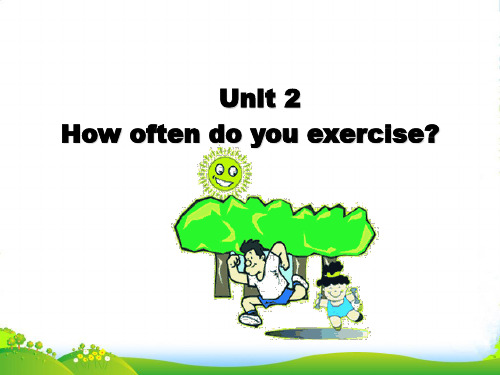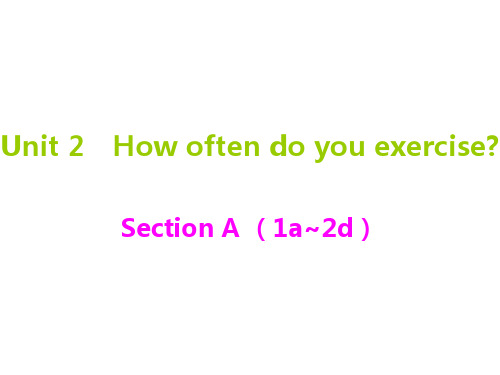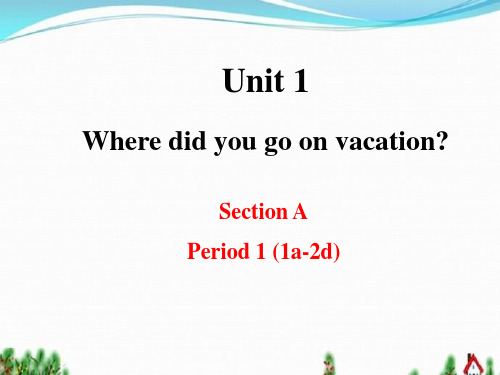人教版初二英语上册 ppt课件
合集下载
期末总复习课件(共47张PPT) 人教版英语八年级上册.ppt

例如:He likes apples.他喜欢苹果。 ( 主语是He, likes 是动词第三人称单数形式)
一般现在时的关键词:always,(总是),often(经常), usually (通常), never从未;every day每天, every week每周, every year每年, sometimes有时候, at times时常。
A.as better as B.as good as √C.as well as
( )8.The programs on Channel 10 are ____better than Channel 5.
A.more
√B.much
C.many
( )9.He is _____than any other students in his class.
A.cold B√.colder
C.coldest
( )14.Which city is______,Bei jing,Shang hai or Liuzhou?A.bigB.bigger
√C.the biggest
模块5和6:动词不定式 (1)、(2)和双宾语。 1.动词不定式(带to的动词):to+动词原形(注:to do代表不定式) 例如:She wants to see her aunt.她想去看望她的阿姨。
( )4.I______ my homework when my mother came home.
A.am doing √B.was doing C.did ( )5.She often ______ shopping with her mother.
A√.goes B.go C.went ( )6.We_____swimming tomorrow afternoon.
一般现在时的关键词:always,(总是),often(经常), usually (通常), never从未;every day每天, every week每周, every year每年, sometimes有时候, at times时常。
A.as better as B.as good as √C.as well as
( )8.The programs on Channel 10 are ____better than Channel 5.
A.more
√B.much
C.many
( )9.He is _____than any other students in his class.
A.cold B√.colder
C.coldest
( )14.Which city is______,Bei jing,Shang hai or Liuzhou?A.bigB.bigger
√C.the biggest
模块5和6:动词不定式 (1)、(2)和双宾语。 1.动词不定式(带to的动词):to+动词原形(注:to do代表不定式) 例如:She wants to see her aunt.她想去看望她的阿姨。
( )4.I______ my homework when my mother came home.
A.am doing √B.was doing C.did ( )5.She often ______ shopping with her mother.
A√.goes B.go C.went ( )6.We_____swimming tomorrow afternoon.
人教版初中英语八年级上册Unit 1 Section B 2a---2d(共15张PPT)

Penang is a beautiful city in Malaysia. And we can go to climb Penang Hill. It is very famous.
We can also go to the beach. We can try paragliding there.
where
Jane's why vacation who
how
feelings
what
see food
hear do
My vacation who
where Shunping Wangshi
Manor
when last summer
what
see
old buildings, old trees , red lanterns, a garden, old books...
of rice and
Yes
some fish
It was so exciting.
She enjoyed walking around the town. It rained hard and they didn’t see anything.
Read and fill in the blanks .
Unit 1
Think about it.
Do you like vacations? What do you like to do on vacation?
This is Cao Ge. He is from Malaysia.
He is a Malaysian.
He decides to show us something special about Malaysia.
人教英语八年级上册Unit2 Section A 1a—2c(共33张)-课件

Four times a week.
read some books (always)
every day
A: What does she do on weekends?
B: She always reads some books.
A: How often does she do some reading? B: Every day.
always
总是
usually
通常
often
常常
hardly ever
几乎不
sometimes
有时
never
从不
What does she usually do on weekends? She usually does homework.
She often does some reading.
Words preview
once adv. 一次 twice adv. 两次 time n. 次;次数 surf v. 在……冲浪;
在激浪上驾 (船) Internet n. 网络;互联网 program n. 节目;表演
What do you usually do on weekends? I usually …
2. I visit my grandparents twice a year. How often do you visit your grandparents?
Thank you.
都二
能分
运浇
用灌
好,
“八
二分
八等
定待
律;
”二
,分
我管
们教
一,
起八
,分
静放
待手
花;
read some books (always)
every day
A: What does she do on weekends?
B: She always reads some books.
A: How often does she do some reading? B: Every day.
always
总是
usually
通常
often
常常
hardly ever
几乎不
sometimes
有时
never
从不
What does she usually do on weekends? She usually does homework.
She often does some reading.
Words preview
once adv. 一次 twice adv. 两次 time n. 次;次数 surf v. 在……冲浪;
在激浪上驾 (船) Internet n. 网络;互联网 program n. 节目;表演
What do you usually do on weekends? I usually …
2. I visit my grandparents twice a year. How often do you visit your grandparents?
Thank you.
都二
能分
运浇
用灌
好,
“八
二分
八等
定待
律;
”二
,分
我管
们教
一,
起八
,分
静放
待手
花;
人教版英语八年级上册 PPT

Saturday in our school. 下周六我们学校将有一场足球比赛。
2. come, go, leave, arrive等表示位置移动的动 词常用现在进行时表示将要发生的动作,它 们很少与be going to 结构连用。例如:
Miss Sun is coming tonight. 今晚孙小姐要来。
用所给词的适当形式填空:
1.There _is_g_o_i_n_g__to__b_e_ (be) an American film next week.
2.They _a_r_e_g_o_i_n_g__to__fi_n_i_sh__ (finish) the work this afternoon.
professional basketball player practice basketball every day
pilot/ exercise every day
一般将来时态
所有时态都是通过
动词
变化来体现的
future past now He often watches TV at night.
Mother cooks breakfast for us every day. (动词)
Grandma is cooking supper in the kitchen. (动词)
• [短语]cook ...for sb.为某人做
4.doctor n.医生 • [例句] • She felt so ill and we had to call the
8.pilot n.飞行员 • [例句]
• The pilot landed the plane safely.
• My brother is going to become a pilot. • [联想]pilot v.驾驶(飞机等),领航 • [谚语]In a calm sea, every man is a pilot. 平静的海上易驶船。
2. come, go, leave, arrive等表示位置移动的动 词常用现在进行时表示将要发生的动作,它 们很少与be going to 结构连用。例如:
Miss Sun is coming tonight. 今晚孙小姐要来。
用所给词的适当形式填空:
1.There _is_g_o_i_n_g__to__b_e_ (be) an American film next week.
2.They _a_r_e_g_o_i_n_g__to__fi_n_i_sh__ (finish) the work this afternoon.
professional basketball player practice basketball every day
pilot/ exercise every day
一般将来时态
所有时态都是通过
动词
变化来体现的
future past now He often watches TV at night.
Mother cooks breakfast for us every day. (动词)
Grandma is cooking supper in the kitchen. (动词)
• [短语]cook ...for sb.为某人做
4.doctor n.医生 • [例句] • She felt so ill and we had to call the
8.pilot n.飞行员 • [例句]
• The pilot landed the plane safely.
• My brother is going to become a pilot. • [联想]pilot v.驾驶(飞机等),领航 • [谚语]In a calm sea, every man is a pilot. 平静的海上易驶船。
人教版八年级英语上册-全册PPT课件全集(149张)

26) more than 多于
课文要点
1、What do you usually do on weekends?
on weekens 表示“在周末”,泛指每个周末; on the weekend表示“在周末,在这个周 末”,特指某个周末。
2、help with housework
help sb. with sth. = help sb. (to) do sth
初二英语上册
Unit 1: Where did you go on vacation?
New Words.
anyone wonderful something seem someone try different umbrella hungry dislike anywhere most everyone bored dicide wonder wait enough
修饰不可数名词,意为 “太多”,还可修饰动词 做状语
修饰形容词或副词,意为 “太”
She bought too many eggs. We have too much work to do.
You are walking much too fast.
too much, much too,用法区别看后头,much后接不可数, too后修饰形或副。Too many 要记住,后面名词必复数。
1)单数名词词尾加’s, 复数名词词尾没有s, 也要加 ’s the girl’s pen Children’s Day
2)复数名词以s结尾的只加 ’ the students’ reading room
3)如果两个名词并列,并且分别有 ’s, 则表示“分别有”; 只 有一个名词有一个’s, 则表示“共有”;
人教版八年级英语上册课件:Unit 2(共29张PPT)

B
要点梳理
( )2. We need a good night’s sleep because we have got a _____ day tomorrow. A. empty B. hungry C. full D. free ( )3. Don’t _____ the bowl with water because it will spill(溢出). A. fill B. full C. filled D. fills
要点梳理
【应用】 ( )1. Sun Yang _____ every day and he swims very well. A. exercise B. exercises C. do exercise D. does exercises
要点梳理
B
( )2. Tom does eye _____ in the classroom after doing math _____ for half an hour. A. exercises; exercises B. exercise; exercise C. exercises; exercise D. exercise; exercises
【举例】He can hardly speak English. 他几乎不会说英语。 They hardly ever spoke another word. 他们几乎没有再说一句话。 He can hardly understand it, can he? 他几乎不懂,是吗?
要点梳理
课前导学
three times a week
use the Internet
swing dance
have to
你周末通常做什么?
要点梳理
( )2. We need a good night’s sleep because we have got a _____ day tomorrow. A. empty B. hungry C. full D. free ( )3. Don’t _____ the bowl with water because it will spill(溢出). A. fill B. full C. filled D. fills
要点梳理
【应用】 ( )1. Sun Yang _____ every day and he swims very well. A. exercise B. exercises C. do exercise D. does exercises
要点梳理
B
( )2. Tom does eye _____ in the classroom after doing math _____ for half an hour. A. exercises; exercises B. exercise; exercise C. exercises; exercise D. exercise; exercises
【举例】He can hardly speak English. 他几乎不会说英语。 They hardly ever spoke another word. 他们几乎没有再说一句话。 He can hardly understand it, can he? 他几乎不懂,是吗?
要点梳理
课前导学
three times a week
use the Internet
swing dance
have to
你周末通常做什么?
人教版八年级上册英语Unit1 Where did you go on vacation课件(35张ppt)

•Language structures:
Where did you go on vacation? I went to New York City. Did you go out with anyone? No. No one was here. Everyone was on vacation. Did you buy anything special? No, I bought nothing. How was the food? Everything tasted really good!
Linda: Did you go shopping?
Alice: Of course! I bought ______ for my parents, but _______ for myself.
Linda: Why didn’t you buy _______ for yourself?
Alice: I didn’t really see _______ I like.
Pairworks:
1. How was your vacation?
It was pretty good.
2. What did ...?
I went ...
3. How was ....?
It was fantastic.
4. How were ...?
They were friendly.
在这里可以让学生用他们所会的词语回答.
They
My parents.
Task 1 Talk about your vacation activities.
went to the mountain went to the summer camp
八年级上册英语全册课件(人教版)

Claire: Twice a week, on Wednesday and Friday. Jack: Well, how about Tuesday? Claire: Oh, I have to play tennis with my friends.
But do you want to come? Jack: Sure.
Where did you go on vacation?
went to New York City
Where did you go on vacation?
went to the beach
Where did you go on vacation?
visited my uncle
Where did you go on vacation?
全北美京著新名A世的M纪C电电影影院院线 I often go to the movies.
I often play football.
What do you usually do on weekends? I often do some reading. I often watch TV.
What do you usually do on weekends?
2a Listen. Cheng Tao is talking about how often he does these activities. Number the activities you hear <1-5>.
3
5 4 2
2b Listen again. Match the activities in 2a with how often Cheng Tao does them.
- 1、下载文档前请自行甄别文档内容的完整性,平台不提供额外的编辑、内容补充、找答案等附加服务。
- 2、"仅部分预览"的文档,不可在线预览部分如存在完整性等问题,可反馈申请退款(可完整预览的文档不适用该条件!)。
- 3、如文档侵犯您的权益,请联系客服反馈,我们会尽快为您处理(人工客服工作时间:9:00-18:30)。
(3? -Of course.
A: _E_x_c_u_s_e__ _m__e_____M! _ay_____I__ ________ borrow your ruler?
B: C_e_r_t_a_in_l_y_!T_a_k_e_____ this one. A: Thank you. Oh, this one is short. Do you __h_a_v_e___ a long
___o_n_e___? B: _S_o_r_r_y___, I don’t.
A: _E_x_cu_s_e___ _m__e_____! Dohyaovue _______ru_learlong ________? C: Yes. A: __M__a_y___ I borrowit________? C: Certainly! Here ___y_o_u___ _a_re______.
Unit 2 How do you come to school?
一般现在时:表示动作的习惯性 或 经常性。
I go to school every day. We sometimes play basketball after class.
特别要注意,在英语的一般现在时的使用中,如果 主语是第三人称单数,谓语动词也要相应地采用第 三人称单数的形式。
paper 纸;纸张 为不可数名词,通常不用“a”或 “an” 这样
的不定冠词来修饰。
Paper is very useful(有用的). The paper here is not clean.
a piece of paper two piece of paper three glasses of water seven bottles of orange
An orange is orange. 橘子(可数) Would you like some orange?
橘子汁(不可数)
short 短的;矮的 tall 长的 long 高的
a short pen 短的 a long pen 长的 a short time 短的 a long time 长的 a short girl 矮的 a tall girl 高的
运用某种交通工具去某地的表达: -How do you usually come/go to…?
-I usually come/go to….
by bike
by bus
by car
by train
by plane/air by ship/sea
on foot
她每天乘公共汽车去上学。
误:She by bus to school every day.
形容词比较级、最高级的变化:
small smaller smallest
nice
nicer nicest
正:She goes to school by bus every day.
独一无二的事物前要用定冠词 the
the moon the sun the earth the sea the U.S.A the People’s Republic of China
交际用语: It’s a fine day for a walk. How do you usually come to school? I usually come to school by bike.
She goes to school every day. Does she go to school every day? She doesn’t go to school every day.
频度副词:
usually often sometimes
通常 经常;常常 频度副词的位置:
有时
I usually stay at home on Sundays. Does she often come here? They don’t often watch TV. Usually she gets up late on Sundays. They play games after class sometimes.
初二英语 上册
Unit 1— Unit 7
世和
Unit 1 Welcome back!
May I…? 我可以……吗? 表示客气的请求。
(1) -May I come in? -Come in, please.
(2) -May I borrow your pen , please? -Certainly!
Unit 3 Mid-Autumn Day
形容词的比较级:表示两者之间的比较。 形容词的比较级+ than
Jim is taller than Tom. This ball is bigger than that one
形容词的最高级:表示三者或三者以上进行 比较,程度最高的一个。
Mary is the tallest girl in our class. My bag is the heaviest of the three.
time 时间 (不可数名词) It’s time to go to bed.
time 次数 (可数名词) next time three times five times
once twice
一次 两次
交际用语: Welcome back to school! May I come in, please? I’m sorry I’m late. It doesn’t matter. May I borrow/have…, please? Here, take this one.
paper 既可以作可数名词,也可以作不可数 名词,但所表达的意思不同
I want to buy an evening paper. 报纸(可数)
I need some paper to write a paper. 论文(可数)
Please hand in your papers, please. 试卷(可数)
A: _E_x_c_u_s_e__ _m__e_____M! _ay_____I__ ________ borrow your ruler?
B: C_e_r_t_a_in_l_y_!T_a_k_e_____ this one. A: Thank you. Oh, this one is short. Do you __h_a_v_e___ a long
___o_n_e___? B: _S_o_r_r_y___, I don’t.
A: _E_x_cu_s_e___ _m__e_____! Dohyaovue _______ru_learlong ________? C: Yes. A: __M__a_y___ I borrowit________? C: Certainly! Here ___y_o_u___ _a_re______.
Unit 2 How do you come to school?
一般现在时:表示动作的习惯性 或 经常性。
I go to school every day. We sometimes play basketball after class.
特别要注意,在英语的一般现在时的使用中,如果 主语是第三人称单数,谓语动词也要相应地采用第 三人称单数的形式。
paper 纸;纸张 为不可数名词,通常不用“a”或 “an” 这样
的不定冠词来修饰。
Paper is very useful(有用的). The paper here is not clean.
a piece of paper two piece of paper three glasses of water seven bottles of orange
An orange is orange. 橘子(可数) Would you like some orange?
橘子汁(不可数)
short 短的;矮的 tall 长的 long 高的
a short pen 短的 a long pen 长的 a short time 短的 a long time 长的 a short girl 矮的 a tall girl 高的
运用某种交通工具去某地的表达: -How do you usually come/go to…?
-I usually come/go to….
by bike
by bus
by car
by train
by plane/air by ship/sea
on foot
她每天乘公共汽车去上学。
误:She by bus to school every day.
形容词比较级、最高级的变化:
small smaller smallest
nice
nicer nicest
正:She goes to school by bus every day.
独一无二的事物前要用定冠词 the
the moon the sun the earth the sea the U.S.A the People’s Republic of China
交际用语: It’s a fine day for a walk. How do you usually come to school? I usually come to school by bike.
She goes to school every day. Does she go to school every day? She doesn’t go to school every day.
频度副词:
usually often sometimes
通常 经常;常常 频度副词的位置:
有时
I usually stay at home on Sundays. Does she often come here? They don’t often watch TV. Usually she gets up late on Sundays. They play games after class sometimes.
初二英语 上册
Unit 1— Unit 7
世和
Unit 1 Welcome back!
May I…? 我可以……吗? 表示客气的请求。
(1) -May I come in? -Come in, please.
(2) -May I borrow your pen , please? -Certainly!
Unit 3 Mid-Autumn Day
形容词的比较级:表示两者之间的比较。 形容词的比较级+ than
Jim is taller than Tom. This ball is bigger than that one
形容词的最高级:表示三者或三者以上进行 比较,程度最高的一个。
Mary is the tallest girl in our class. My bag is the heaviest of the three.
time 时间 (不可数名词) It’s time to go to bed.
time 次数 (可数名词) next time three times five times
once twice
一次 两次
交际用语: Welcome back to school! May I come in, please? I’m sorry I’m late. It doesn’t matter. May I borrow/have…, please? Here, take this one.
paper 既可以作可数名词,也可以作不可数 名词,但所表达的意思不同
I want to buy an evening paper. 报纸(可数)
I need some paper to write a paper. 论文(可数)
Please hand in your papers, please. 试卷(可数)
